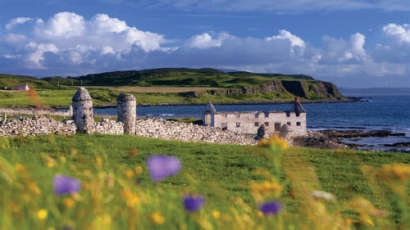
In June, Northern Irelands economy minister Diane Dodds announced the creation of a new Economic Advisory Group, chaired by a former head of Ulster Bank, Ellvena Graham. Looking to a post COVID future, Graham, said,“It’s not just the immediacy around the options and various packages, but looking to the longer term, growth sectors, looking at the policy levers which might be needed, linked into the green recovery and skills strategy.”
GenComm Project Co-Ordinator, Paul McCormack, agreed, stating, “The Valentia and Rathlin 360˚ Destination Green(c) strategy is a full circle net zero energy approach, a catalyst for growth in all sectors towards a greener horizon. The strategy seeks to balance a sustainable and inclusive tourism demand that will be coupled with similar renewable energy, mobility and industrial strategies based on continually reducing the island’s carbon imprint and not leaving an environmental impact. This work is aimed at increasing the islands energy autonomy, delivering energy security and resulting in Rathlin and Valentia being net zero exemplars for Europe.”
Colum O’Connell, Chairman of the Valentia Energy Group, said, “Yes. Here in Valentia as part of the program to achieve UNESCO recognition for the transatlantic cable, the Cable Station in Valentia is being upgraded to become a digital hub and an interpretive center for tourism. The development of the hub has potential for the Energy Co-op to be based and grow in this environment attracting investment in new technology and academia.”
Michael Cecil, Rathlin Development and Community Association Chairman, said, “All Islands historically are early adopters of new technology due to necessity and their location. Islands are geographically contained so impacts of emerging technology are easily measured and potentially scalable across larger land masses. Once early adoption and pilot schemes become established on smaller Islands enterprise zones will grow organically through research and ongoing development.”
Cecil and O’Connell both understand the possibility of gaining autonomy from a larger grid with the carbon neutral energy and that they can learn from other island experiences from around the globe.
Cecil says, “All options for our renewable energy future are on the table and will be explored fully in a robust feasibility study, shortly to go out to tender.
“Our primary focus is to increase capacity to produce energy on the island using rich natural resources of wind, wave, tidal and solar power, strengthening our energy security and making our contribution towards carbon neutrality from a small island. Other islands have been driven by circumstance to develop their own autonomous grid fuelled by renewable energy, such as Eigg, in Scotland. Rathlin has been connected to the grid since 2007 and we expect that to remain in place, not least as a means of exporting energy produced from renewable sources on the island.
“Orkney and the commitment from the Scottish Government to hydrogen production is a particularly inspiring experience from which we hope to learn. We want our islands to be net energy producers and so to be able to export so rather than the apparent severing of links implied by autonomy we are looking for greater security within interdependence, maintaining links that can become of greater benefit to us in two way energy traffic. “
Likewise O’Connell is confident of how the island energy co-op future looks saying, “Yes - we have seen this in Ireland through Tipp Energy which is one of the first community owned power projects, an independent social enterprise which focuses on driving an energy transition.”
Cecil said, “Our commitment to the island as a 360° Green Destination is ensuring that commercial, tourist and academic and research growth on the island is in balance with the environmental and economic needs of the community, honoring the island’s culture and heritage.”
Speaking with regard to the Valentia experience, Colum says, “In Valentia we have always thought that renewable energy would be a complement to our strategy to attract new families. Valentia is a registered Chapter with Grow Remote Ireland, which is a not for profit on a mission to enable us to work, live and participate locally.”
Keeping the region as vibrant as possible is especially important to the islands and more vital than ever before. There is a fear that the Northern Ireland economy could shrink by 7.5% this year so everyone is having to think outside the box. Infrastructure Minister Nichola Mallon recently confirmed the North South Interconnector has been given planning permission. SONI, the electricity System Operator for NI welcomed the decision which it said will be a ‘catalyst’ for the region's response to climate change, reduce consumer costs and provide a secure long term electricity supply. Both spokesmen for the islands agree that renewables growth can bring both economic and environmental payback.
WIth the ‘Hylanders’ strategy the energy security is a distinct possibility not just a bold vision, Cecil maintains, “Currently, as for most small islands, we are at the end of an exceptionally long supply chain which leaves our energy supplies vulnerable to any changes in logistics of transport or supply as well as cost. As our market is so small it can be heavily dependent on commercial and political will for infrastructure security and economic accessibility.
“Changes in international markets and national government policies on climate change targets may mean small markets like ours, at the end of the chain, become even more fragile. Rathlin Island, like many other islands in this latitude, is ideally suited for appropriate development of its abundant natural resources. It would seem irresponsible, in the light of experiences with renewable energy development elsewhere, to ignore these rich opportunities on our doorstep. “
The new Energy Strategy for Northern Ireland which extends to 2050 is a hot topic of debate right now and the islands aspirations are a major part of the debate.

